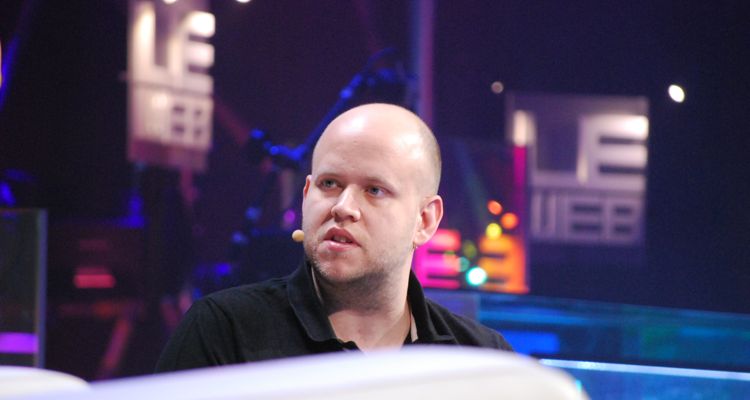
About three months back, a court rejected Spotify’s motion for a protective order in a long-running legal battle, thereby determining that CEO Daniel Ek would have to provide an up to three-hour deposition. Now, a different judge has affirmed the ruling despite the Stockholm-based streaming platform’s objections.
This latest verdict represents one of several twists in a much-publicized lawsuit that kicked off three years ago. In brief, regarding the marathon showdown’s history, Eminem publisher Eight Mile Style in August of 2019 accused Spotify of infringing upon 243 of the rapper’s compositions and failing to pay royalties on billions of streams.
Interestingly, Eight Mile demanded not only north of $36 million in damages from Spotify, but called for “advertising revenue and the value of the equity interest Eight Mile was deprived of by virtue of the infringement.” Spotify refuted the allegations (“the underlying infringement claim by Eight Mile lacks merit”) while also maintaining that it had been “licensed by Eight Mile’s agent, Kobalt” to offer fans access to the popular tracks, including “Not Afraid” and “Lose Yourself.”
As a result, Spotify named Kobalt as a third-party defendant, and Eight Mile Style then roped in the Harry Fox Agency (HFA) as an additional defendant, alleging that it and the streaming platform had coordinated on a “fraudulent scheme” to cover up an overarching “failure to acquire timely compulsory mechanical licenses.”
Moving beyond these basic background details and to the deposition of Daniel Ek, Judge Jeffery S. Frensley denied Spotify’s motion for a protective order at March of 2022’s end, as initially disclosed.
“The Court credits Spotify’s assertion that he [Daniel Ek] is very busy indeed,” the judge explained. “Yet, the issue of proper licensing relationships with the artists whose work comprises the entirety of Spotify’s business and its sole product is surely also a matter of importance to Spotify, worthy of some of Mr. Ek’s time and attention. … Plaintiffs may take the deposition of Mr. Ek by remote means only for a maximum of three hours.”
Spotify promptly pursued a review of the ruling – albeit without objecting to “the conclusion that Ek should be subject to deposition,” according to today’s determination. “Rather, Spotify ‘seeks to modify the order to defer any deposition of Mr. Ek until the damages phase of this case,’” Judge Aleta A. Trauger wrote in an order dated July 15th.
In support of the deposition delay, Spotify stated that the previous ruling’s judge had overlooked purported discovery limits for when sought information can be more conveniently obtained from other sources (different execs in this instance).
Additionally, Judge Frensley was said to have erred by “violating the applicable Case Management Order’s bifurcation of discovery” – liability under the Music Modernization Act (MMA) on the one hand and any owed damages on the other – “because Ek’s testimony would only be relevant to the issue of damages” in the second phase, per the lawsuit’s newest decision.
After reiterating that “the court is not empowered to reverse the magistrate judge’s ruling simply because this court would have decided the issue differently,” however, Judge Trauger indicated that “the court has little difficulty rejecting” the first of Spotify’s aforementioned arguments against the deposition, concerning the possibility of substituting another exec for Daniel Ek.
“The Magistrate Judge concluded that an appropriate balance could be reached [between Ek’s professional responsibilities and the deposition] by allowing a time-limited, remote deposition of Ek that could be completed from virtually anywhere on Earth in less than half a day,” according to the ruling.
“Spotify argues that, even if Ek is able to testify about whether Spotify took an inappropriately loose approach to licensing requirements in order to quickly establish its foothold in the streaming market, that testimony would be relevant, if at all, only to whether the plaintiffs are entitled to enhanced damages based on Spotify’s willfulness,” Judge Trauger continued.
But the prior ruling “concluded that Ek’s testimony was relevant to the subject matter covered by the first phase of discovery because it bears on the court’s analysis pursuant to the MMA” – or Spotify’s liability under the law, specifically with regard to damages limitations afforded to streaming services that take certain actions.
“The MMA provision to which Ek’s testimony appears most likely to be relevant is not an outright safe harbor from liability, but rather a limitation on remedies, meaning that, under a conventional two-phase inquiry, evidence bearing on the applicability of that provision would be relevant only to the second phase,” the judge finished in denying the defendant platform’s motion for review. “But Spotify concedes in its briefing that the first phase of discover[y] encompasses both ‘liability and MMA compliance.’”
At the time of this piece’s publishing, Ek didn’t look to have commented publiclyon the development. Last month, the 39-year-old laid out his ambitious vision for Spotify’s long-term revenue potential, after buying $50 million worth of the company’s stock in May.
